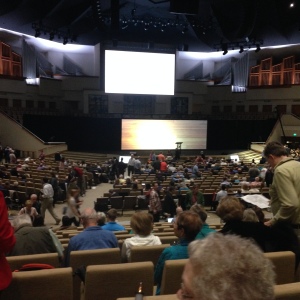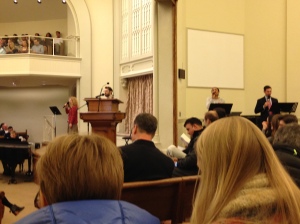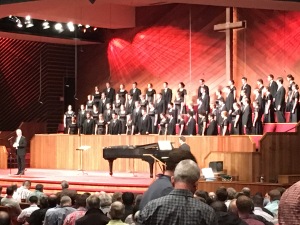![]()
Friends it has been a while since the last 5pm Update (a good indication that things have been a bit full on!) – in fact there has not been an update since I returned from Study Leave for Easter. Thanks for allowing me time to get away.
Study Leave meant that I could attend a series of Conferences, visit a series of Churches and check-out some theological colleges. Refreshing? – Yes! Challenging? – At times! Educational? – Mostly! Beneficial? – I hope so, but you will need to be the judge of that.
There were so many times that I just felt immensely thankful to God for Trinity City and for 5pm Church and for the leaders we have and for the ministry that we do – and thankful because I could see other examples in the States of similar ministries or conversely I could see examples of things that were not done half as well as how Trinity does it (under God of course).
Here are 5 reflections with 5 corresponding challenges which may be of benefit for us.
- Welcoming Matters
Of the churches I visited, several similar in size or demographic to our own, I was the visitor. I was not looking for a welcome, but it was interesting that when it happened it made such a positive difference to the way church was experienced.
I realised that ‘church’, as in the service, can be arranged and run by the efforts of a relativity contained group of people (e.g. office admin, audio/video ministry team, musos, gathering leader and a few up front roles, preacher, supper providers etc.) – but what cannot be done by the few and must be done by the all, is welcoming.
When I turned up, found my way to a pew, looked at the people around – I assumed that all around were regulars or members of the church (they could have been visitors like me!), and something as simple as a short ‘hello’ helped me to think that I was welcome. Everyone in a church family plays a role in welcoming, because the instant that one person does not acknowledge the other, the impression given is that this church is unwelcoming.
Challenge: For 5pm Church to be welcoming, everyone has a part to play and it may be a simple as saying ‘hi’ to someone you don’t know.
2. The Gospel Matters
There were plenty of differences easily on display in each church I entered. Accents, style of building , order of service, music style (although every church I visited happen to sing ‘It is Well with my Soul’ just each in a different style!), liturgy, preaching, demographics, visual presentations and the list could go on.
What we had in common was the gospel of Jesus. For all that difference, our unity across that diversity was found in the gospel (Eph 4:1-16).
I realised (or maybe it reinforced my thinking) that what is most important for our church family is that we focus on the gospel and that together we each focus on our relationship with Jesus before all else. Now I say that, because if I measured my ‘satisfaction’ of chu rch by anything other than the gospel, then I am telling myself lies. The danger is that I start to put secondary elements before primary elements and so if, for some reason, any of those secondary elements falters, then I lose connection with church. My dissatisfaction gets directed at the way church members treat me, how the service didn’t make me feel good, how the music was not my style, how the pastor let me down, how the supper was not filling enough and so on. In other words, my relationship with Jesus should be primary and he will never falter whereas his church always will.
rch by anything other than the gospel, then I am telling myself lies. The danger is that I start to put secondary elements before primary elements and so if, for some reason, any of those secondary elements falters, then I lose connection with church. My dissatisfaction gets directed at the way church members treat me, how the service didn’t make me feel good, how the music was not my style, how the pastor let me down, how the supper was not filling enough and so on. In other words, my relationship with Jesus should be primary and he will never falter whereas his church always will.
Challenge: For 5pm Church to individually focus on the gospel of Jesus so that corporately we might be drawn together as a family – the body of Christ.
3. Worship Matters
Of the churches I visited the style of worship was quite varied – yet in each case very helpful. Whilst the idea of ‘worship’ in the Bible is driven by the pursuit of holy and obedient living (Rom 12:1), the ‘worship’ I refer to here is the way that a church family listens carefully to the Word of Christ, sings psalms, hymns and spiritual songs, and admonishes one another offering thanks to God (Col 3:16).
I was challenged by the services that took time and space to help people reflect on their relationship with God. How some services called people to confess both individually and corporately. How some services gave space for prayers and supplications to be offered personally right through to nationally. How each service preached the Bible – some shouted, some reasoned, some used more illustrations that might have been needed, all longer that 50 minutes and all passionate about hearing the Word of Christ.
But what stuck me most was the variety in musical presentation. At Orlando Baptist a thirty piece orchest ra. At Redeemer Presbyterian a piano player, violist and song leader. At Village Church Barrington a garage band complete with interactive stage lights. At Grace Community Church a brass band, 80 person choir, and soloists. At Capitol Hill Baptist four song leaders and guitar and piano. Yet for all the difference, what was important was not the style or the production, but what they were singing about. Jesus.
ra. At Redeemer Presbyterian a piano player, violist and song leader. At Village Church Barrington a garage band complete with interactive stage lights. At Grace Community Church a brass band, 80 person choir, and soloists. At Capitol Hill Baptist four song leaders and guitar and piano. Yet for all the difference, what was important was not the style or the production, but what they were singing about. Jesus.
Challenge: For 5pm Church to support Mark Peterson in the way that he faithfully leads us and sing together (irrespective of the various and particular styles on display any given week), and sing together about what matters – Jesus.
4. Theology Matters
The bread and butter of a church family rests in what they know and understand of God through his Word. Where there is a good and deep understanding, the spiritual maturity of a church is obvious and healthy. Where there is a poor or shallow understanding, the spiritual maturity of a church is fragile and often self-centered and individual.
This was obvious at the churches I visited. The focus that was given to preaching the Bible, training in the Bible, meeting around the Bible and more, was easily seen in the way that congregations behaved. Be it the stream of members walking miles to get to church because the parking was full, or the way that they carried their own Bibles stuffed full notes into church even though there were already Bibles in the pews, or the way that they attended (adult) Sunday School classes (one church had a seven year cycle of subject streams), or the way they talked about the sermon over morning tea after. In each case it spoke volumes about what the members held to be important – and I was encouraged.
to get to church because the parking was full, or the way that they carried their own Bibles stuffed full notes into church even though there were already Bibles in the pews, or the way that they attended (adult) Sunday School classes (one church had a seven year cycle of subject streams), or the way they talked about the sermon over morning tea after. In each case it spoke volumes about what the members held to be important – and I was encouraged.
But what stood out most to me was that the place where ‘the church’ was most clearly taught theology – that is how to deeply understand God – was at the church. It wasn’t franchised out to the Seminary (which in two cases was onsite), or to the para-church organization, or to the mission agency. The Church Theologian was the Church Pastor. The Bible shepherds were the leaders/elders.
Challenge: For me, in relation to our 5pm Church Family, is not to shirk my responsibly to read, prepare and teach the Bible well. To teach in season and out and to ensure there are various opportunities for our church family to be getting into the Bible – be that at Church each week, in Home Group, in School of Ministry, at Church Together or weekends away or…
5. Commitment Matters
The way that commitment is measured in a church will always be flawed – we could look at or use attendance numbers, giving figures, service involvement, expressed attitude, involvement in ministry activities, feedback or surveys – and in some ways each of those measures could be helpful. But they will be flawed.
In the end, commitment is measured by Jesus as the one whom we each are committed too. It is his church. It is he who will ask us about our commitment (2 Tim 4:1; 1 Peter 4:1-6).
Our job together is to encourage one another in that commitment so that we help one another until that day when Jesus does return (Heb 10:24-25).
One of the churches I visited took commitment to God and to one another as a church family very seriously – and it was a picture of heaven. Impressive to see many (not all) eager to live in ways that honoured God first and as a result served others before themselves. At times this was in celebrating victories or in serving together, at other times it was seen in the impressive way that they held each other accountable – correcting, rebuking, encouraging with honesty, patience and careful instruction (2 Tim 4:2). This was counter cultural (even for America) but yet it spoke volumes about the way that church loved one another.For them gospel faith mattered and showed itself tangibly in the way they committed themselves to one another.
Challenge: For 5pm Church, to commit to God then others before oneself is not just strange, it is counter intuitive, it rejects individualism, and is almost un-Australian – but it is Christian. This challenge is probably the most difficult for 5pm Church, but under God, would be the most beneficial.
Thank you so much for allowing me time to take this leave. Thank you so much for giving me the honour and privilege of being your Pastor.
Thanks Ken for taking out the time to give us a summary of your experiences of other churches. This does reveal to me the need and desire for us to be good ministers of the word. This also says that we should not look at what the church does for us, but what i can do for the church. We exist to expand the Kingdom by proclaiming Christ.
LikeLike
Hi Peter,
That is helpfully expressed my friend. Yes. Christ first, then others before ourselves and we put ourselves in danger with we decide (or unintentionally) reverse the order. K
LikeLike